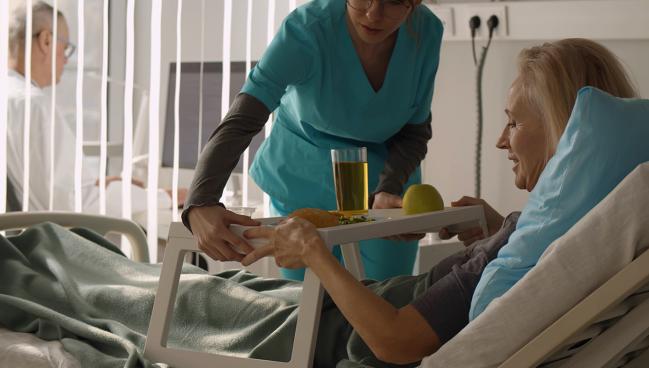CALORI: More Support for Eschewing Fasting Protocols Preprocedure
Compared with patients who fasted, those who didn’t reported a better overall experience with zero safety compromises.

LONG BEACH, CA—The long-held practice of requiring patients to fast prior to cardiac catheterization is again being challenged, this time by a study demonstrating less fatigue and hunger with no safety issues in patients allowed liberal oral intake prior to urgent or elective catheterization.
While preprocedural fasting has remained routine for patients undergoing catheterization—despite no robust evidence to support the practice—, data are accumulating to suggest it is an outdated and unnecessary practice.
The new study, known as CALORI, adds to CHOW NOW, which found no differences in rates of aspiration pneumonia, nausea and vomiting, or contrast-induced nephropathy among those randomized to nothing by mouth (NPO) or unrestricted oral intake before their cardiac catheterization. More recently, a single-center study from Indiana that allowed patients to eat liberally from a heart-healthy menu—literally up to the time of entering the cath lab—also showed no harm, with suggestions of enhanced patient satisfaction due to less hunger and thirst before and after their procedure.
Brian K. Mitchell, MD, MPH (Virginia Commonwealth University, Richmond, VA), who presented the CALORI results here in a late-breaking trial session at SCAI 2024, said this issue is not always a minor one for patients.
“It can have not only negative well-being effects, but there's a lot of really good data to say that there can be negative effects associated with long fasting in specific groups, including elderly people and patients with diabetes,” he told TCTMD. “One thing that we really wanted to do here is to not have a cutoff time.” Mitchell added.
Everyone in the study was an inpatient, but they were allowed to eat—following whatever menu their physician had approved for them—until they were being transported to the cath lab. “I think that enhances the generalizability of this study to outpatients,” he explained. “We're hoping that they're listening to the preprocedural instructions, but we don't know, and who knows what diet they're adhering to.”
Indeed, following the presentation, session panelist J. Dawn Abbott, MD (Brown University, Providence, RI), noted that the sickest patients, like those with STEMI and cardiogenic shock, undergo catheterization procedures routinely with little to no information on the last time they ate.
The 2021 SCAI best practices document still recommends a fasting period of 6 hours for solid food and 2 hours for liquid, but Abbott, who was the first author of that document, said she would probably be open to a more liberal stance.
The fasting rules end up costing health systems money in the long run, panelist Ian C. Gilchrist, MD (Penn State Health Milton S. Hershey Medical Center, Hershey, PA), pointed out. “If you cancel a case because someone had a hotdog for lunch and it’s not been long enough [so they have to] stay overnight, that’s a huge cost to the hospital with no obvious benefit,” he said.
Dishing Up Wins for Not Fasting
The single-center CALORI trial enrolled 198 inpatients (35% female; 47% Black; mean age around 61 years) over an 8-month period in 2023, randomizing them to nothing by mouth after midnight prior to their procedure (n = 94) or a nonfasting protocol (n = 104). Patients at high risk of aspiration and those undergoing complex interventions were excluded. More than 60% of patients in both groups underwent left heart catheterization. The cohort as a whole had a high morbidity burden. Chronic kidney disease (CKD) was present in more than 50% and diabetes in more than 45% in both groups, with approximately 50% of all patients having known CAD.
PCI was performed in 21.7% of the fasting group and 27.7% of the nonfasting group. The mean time from most recent intake of liquids or food to the start of the procedure was 970 minutes in the fasting arm and 148 minutes in the nonfasting group, with Mitchell noting that the time in the nonfasting arm was actually longer than expected. Fentanyl and midazolam were used in more than 80% of patients in both groups for conscious or moderate sedation.
Before and after the procedure, patients were asked to quantify four variables of well-being on a scale of 0 to 5, with 5 being extremely bothered by the variable: hunger, fatigue, anxiety, and nausea. Compared with fasting patients, those not required to fast had better composite preprocedural scores for the primary endpoint, a composite of hunger and fatigue (2.4 vs 6.0; P < 0.001). The preprocedure individual scores for all four variables also were improved in the nonfasting group relative to the fasting group.
One patient in each arm experienced periprocedural emesis. There were no instances of aspiration or need for intubation, and no differences in postprocedural renal function or blood glucose scores.
Postprocedural patient satisfaction scores were similar between groups for access site or other pain, sleep quality and nausea, but the overall satisfaction score incorporating well-being and experience was better in the nonfasting group than in the NPO group (0.3 vs. 1.0; P < 0.001).
Advocating for Change
Despite the accumulating data, Mitchell said it is frustrating that policies are different from institution to institution, with some allowing patients to eat a light meal and others sticking with the tried-and-true NPO.
To TCTMD, he said change is most likely to come from cardiology and anesthesia working together, possibly on a consensus statement to determine which subset of patients scheduled for cardiac catheterization are appropriate for a more liberal oral intake strategy.
“At some institutions [anesthesia] are the gatekeepers, so we would like to work with them and want them to be comfortable with this,” Mitchell added.
Speaking with TCTMD, Abbott said more awareness about the downsides of patient fasting is needed.
“There are still so many institutions that are doing overnight fast, which becomes 12, 18 plus hours of fasting for the patient,” she said. “In our lab, we went to a shorter duration of fasting in the last year in coordination with our anesthesia department. Now that cath labs are not just for coronary procedures anymore, you have to take into consideration that if you have different guidelines for structural patients or patients getting carotid stents or patients getting an [endovascular abdominal aortic aneurysm repair], it can become very complex for the lab and then mistakes will happen.
“So, the consistency is important,” stressed Abbott. “Finding that sort of in-between strategy where it works for the majority of patients in the lab, independent of the procedure type, was how we had to come together with anesthesia.”
L.A. McKeown is a Senior Medical Journalist for TCTMD, the Section Editor of CV Team Forum, and Senior Medical…
Read Full BioSources
Mitchell BK. A randomized trial of cardiac catheterization with fasting versus liberal oral intake: the CALORI trial. Presented at: SCAI 2024. May 2, 2024. Long Beach, CA.
Disclosures
- Mitchell reports no relevant conflicts of interest.




Comments